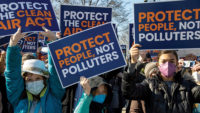Legal
High Court Nixes Expanded Workers' Comp at Hanford Cleanup Site

A tank farm at the Hanford Site.
Photo Courtesy U.S. Energy Dept.
The nation’s high court has ruled that a 2018 law in Washington state broadening the scope of federal and federal contractor employees who can claim workers compensation benefits related to work at the Hanford nuclear waste cleanup site violates the U.S. Constitution’s Supremacy Clause.
In a unanimous opinion released June 21, the U.S. Supreme Court reversed rulings by lower courts that upheld the state law, stating that it “discriminates against the federal government and its contractors” by requiring the U.S. government to pay millions of dollars in claims that state and private employers would not be required to pay.
The US Dept. of Justice had argued that some language in the 2018 law would have made it easier for federal contract workers to obtain workers’ compensation benefits. “It consequently exposes their employers—and by extension, the United States—to massive new costs that similar situated state and private employers do not incur,” Justice said.
State attorneys had argued that the case was moot because Washington has since passed a new law that addresses many federal government concerns. The state also said that a 2011 federal law permitted states to apply their own laws to “all land and premises … which the federal government owns … in the same way and to the same extent as if the premises were under the exclusive jurisdiction of the State.”
Justice Stephen Breyer, who wrote the opinion, found both arguments unconvincing and noted that the case was not moot because a ruling in the government’s favor could save it millions of dollars in claims, and it is unclear how lower courts will view the newly enacted state law.
The 2018 Washington law, HB 1723, amended the state workers; compensation law to apply exclusively to federal contractors at Hanford, a decommissioned nuclear weapon production facility that dates back to the Manhattan Project in the 1940s. Since the end of the Cold War, it has become the setting of a massive ongoing nuclear and chemical waste remediation effort.
HB 1723 expanded eligibility for compensation benefits retroactively to any worker who has spent at least one eight-and-a-half-hour shift at Hanford facilities over the past eight decades. In court documents, Justice Dept. attorneys argued that “the presumption of work-connection [under the 2018 law] applies to whether or not the contract worker preformed dangerous work at Hanford, and it can be rebutted only ‘by clear and convincing evidence' that the illness had a different cause.”
But Washington State Attorney General Bob Ferguson says the Supreme Court ruling will have little practical impact.
“The legislature already fixed the issues the federal government raised. Hanford workers, and all others working in dangerous radioactive waste, remain protected,” he said in a statement. The federal government has not challenged the new law, but if it does, he said, “We will defend those protections all the way back up to the Supreme Court again if we have to.”




